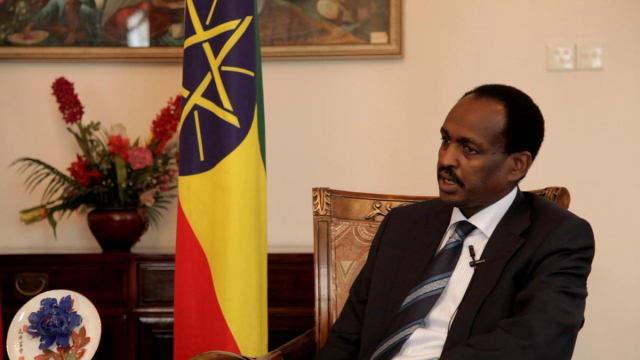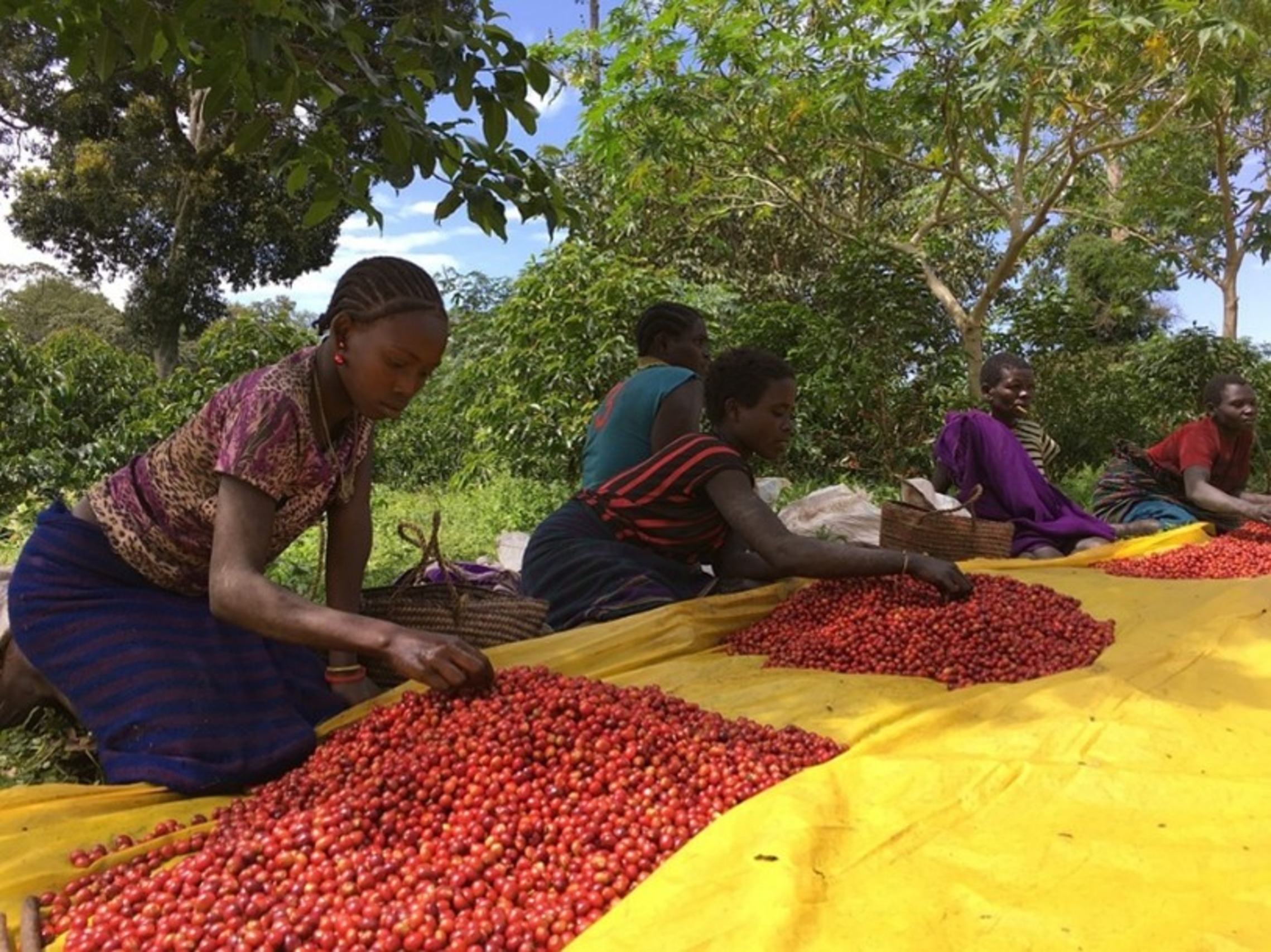The ongoing COVID-19 pandemic is among the greatest challenges facing the global community today. While Ethiopia has had an overall successful response to the pandemic with a low rate of infections and deaths, the country has been negatively affected by global trends. According to the World Bank, Ethiopia is forecasted to have zero percent GDP growth in 2021, a significant decline compared to the estimated 6.1% growth for the 2019/2020 fiscal year. This growth was critical for Ethiopia’s future sustainable development – especially as over 30% of the population still live under the $1.90 a day poverty line, yet the country aims to be a Carbon Neutral middle-income manufacturing hub by 2025.
At Development Reimagined, an African-led development consultancy in Beijing, we were fortunate enough to have the opportunity sit down with Teshome Toga Chanaka, Ethiopia’s ambassador to China, to hear his thoughts on how Chinese cooperation in Ethiopia’s agricultural sector, especially through the enhancement of Ethiopia’s agricultural trade, can support Ethiopia’s post-COVID-19 recovery and future development.
DEVELOPMENT REIMAGINED: Ambassador Toga, thank you for being with us today. Firstly, could you provide us with a brief overview of the Sino-Ethiopian relationship pre-COVID-19?

AMBASSADOR TOGA: Ethiopia’s relationship with China is a healthy and beneficial one. In 2018, bilateral trade reached 4.4 billion USD, equivalent to 27% of our trade with the rest of the world, and the latest FDI figures show an inflow of around USD 4 billion. We are both party to several economic agreements spanning decades, covering trade and investment to technological cooperation. China has also been the source of financing for several large-scale infrastructure projects, such as the Addis Ababa-Djibouti railway. Even during the pandemic, China continues to invest in areas fundamental to Ethiopia’s development, such as the new Aifei Hospital, fully funded by the Chinese to improve Ethiopian public health capacity and disease control. Such infrastructure projects have been essential for our future development.
However, there is still an overall trade deficit. In 2018, for every dollar of Ethiopian products we exported to China, Ethiopia imported 37 dollars’ worth of Chinese products. That said, this is still useful. We now export more to China than to the US – we send 9% of our exports to China, and just 5% to the US. So, our focus now is to find ways of increasing exports to China even more. A key opportunity here lies in China’s Dual Circulation recovery plan, whereby they hope to expand domestic consumption, alongside increasing high-tech manufacturing to reduce their reliance on lower-value exports. Ethiopia could stand to gain in such a scenario. Many of China’s imports from Ethiopia are agricultural goods, so we may indeed benefit from growth in China’s consumer market. However, to gain even more from this requires Ethiopia to address our domestic supply-side constraints and increase our value-added production, which will ultimately help diversify our exports to China.
DEVELOPMENT REIMAGINED: Given that trade has been a central feature of the Sino-Ethiopian relationship, what impact has COVID-19 had on trade flows with China?
AMBASSADOR TOGA: This is a very important question. First, let me provide an overview of COVID-19’s impact on Ethiopia. The pandemic has posed a considerable challenge, not only by placing a major strain on our public health infrastructure but by stimulating numerous collateral effects, such as delays in the movement of commercial goods, and rising food prices. This has placed enormous fiscal pressure on the government to support those most vulnerable. Budgetary constraints have meant we must divert resources from other sectors to tackle these problems. We are participants in the World Bank’s Debt Service Suspension Initiative (DSSI), which provides fiscal space by postponing debt repayments until mid-2021. However, while the DSSI is a start, it is short-term. What Ethiopia really needs is solutions targeting to increase investment inflow and trade while tackling our supply side constraints and ensuring a long-term, resilient recovery.
This brings me to the impact on trade – my second point. In Ethiopia, agricultural exports are the backbone of our economy, accounting for 80% of our export earnings, with coffee alone accounting for 30%. Trade disruptions from COVID-19 have left our agricultural sector and the poorer rural households involved, vulnerable.
DEVELOPMENT REIMAGINED: You raise several critical points Ambassador. Looking towards the future, what are the core challenges Ethiopia faces in post-COVID-19 development and what role can China play in supporting this – in particular in regard to agriculture?
AMBASSADOR TOGA: As I have mentioned, Africa, including Ethiopia, has a significant trade imbalance with China. But this is not unusual. We have such imbalances with others as well. The major problem for Ethiopia, however, has been tackling our supply-side constraints. Such constraints can be overcome by increasing our value-added production capacity, but this requires investment.
Take coffee, for example, our most important export. In Ethiopia, we have been trading coffee for centuries, we are Africa’s top coffee producer! Our coffee exports are valued at USD 833 million last year. Our other top exports are also unprocessed agricultural commodities, with our second and third top exports being oil seeds and cut flowers accounting for 15% and 9.6% of our exports, respectively. But most of our coffee exports are unprocessed – and we need to add value to it. According to Adunga Debela, the Director-General of the Ethiopian Coffee and Tea Authority, Ethiopia’s value-added coffee accounts for under 2% of total exports.
China’s coffee consumption has expanded by 16% in the last decade, therefore coffee-producing African countries must capitalize on this trend. However, this requires investment in manufacturing production so we can move up the coffee value chain by introducing roasting, packaging, and retailing capacity into our domestic economy. This will empower the local economy, with our farmers, private sector, and business people gaining a reliable income alongside generating further direct and indirect employment opportunities. Currently, around 15 million people in Ethiopia rely on coffee production in some form, so a vast amount of our population would benefit.
China can play a vital role in supporting us in overcoming our supply-side constraints by expanding value-added capacity, in coffee production and beyond. Chinese actors in both the private and state-sector should increase investment into African manufacturing capabilities, to help countries diversify their export base and reduce their reliance on primary commodities.
DEVELOPMENT REIMAGINED: As China continues its recovery from COVID-19, what opportunities exist for Ethiopia to reimagine its cooperation and partnerships with China to develop its agricultural sector?
AMBASSADOR TOGA: Whilst there is a breadth of opportunities in the Sino-Ethiopian relationship, it is not without its challenges on all sides. It can be difficult for Ethiopian producers to meet China’s customs clearance standards. We have begun to address these issues, for example, we have recently established a team to work on how we can export meat to the Chinese market.
However, I must reiterate that we need to take two more key steps.
First, we need more investment and joint ventures to help Ethiopia increase its production capacity and quality through skills, knowledge, and technological transfers. This will contribute towards our ability to meet the standards of Chinese consumers and the Chinese government, and therefore increase both our commodity and value-added trade. As our top exports are within agriculture, this sector should be a focal point for value-added investments. Supportive partnerships have already begun to flourish. Recently, in December 2020 Ethiopia’s Oromia Agricultural Institute and the Chinese Institute of Applied Ecology signed a Memorandum of Understanding (MoU) to cooperate in agricultural research to promote the modernisation of our agricultural sector, which will greatly benefit our economy.
Second, we need to work with countries, including China, on intellectual property recognition, for instance via Geographical Indication (GI) agreements, to ensure higher value for our products. Our coffee industry, renowned for its high quality, could benefit massively from this. Currently, three of our coffee-producing regions are trademarked – Sidamo, Harrar and Yirgacheffe – all of which have a distinct taste that cannot be found anywhere else in the world. That’s why you see these labels in Starbucks and elsewhere. Intellectual property protection abroad helps build a unified reputation for our coffee, while maintaining brand value. It also reassures consumers – for example in China – of the quality and origin of the products. Recently, China and the EU signed a reciprocal agreement to protect a number of each other’s GIs, so this is something we in Ethiopia and Africa more broadly can also explore. However, establishing dialogue is the first step.
This leads me to my final point before we end; African countries need more dialogue, cooperation, more investment, and more trade with China, not less.
DEVELOPMENT REIMAGINED: Thank you so much Ambassador Toga for providing a clear overview of the current opportunities and challenges Ethiopia is facing and how China can support the revitalization of Ethiopia’s trade, in particular in regards to agriculture, in post-COVID-19 recovery and future development. We have two key takeaways from our discussion.
- First, it is crucial to increase value-added production now in order to make a resilient recovery, and Chinese actors could play a significant role in this. Both the Chinese public and private sectors have the potential to boost investments to develop African manufacturing capabilities, which would support the diversification of African exports and reduce dependence on primary products. The Ambassador has talked about new agriculture cooperation projects and there are more. There has also been significant investment by the Chinese private sector into manufacturing in Ethiopia. However, the links between the two have not yet been made, nor have Chinese investors yet invested in Ethiopia in order to serve the Chinese market. This is where there is a great deal more potential for innovation, and we hope to see that progress soon.
- Second, strategic cooperation seems to be the keyword for Ethiopia. While a senior diplomat calling for this is far from unusual, it is nonetheless exciting to see the specificity in which the Ambassador is focusing. He has a clear strategy. He is clearly very focused on increasing value-added capacity in agricultural exports, building on the cooperation that is there already, and this is what he is discussing with us and potential Chinese partners every day. It is an indication of the agency the country has with regards to its foreign policy, and we are hopeful that it will succeed.
This article was originally published on the China Africa Project website on 26th March 2021
March 2021


